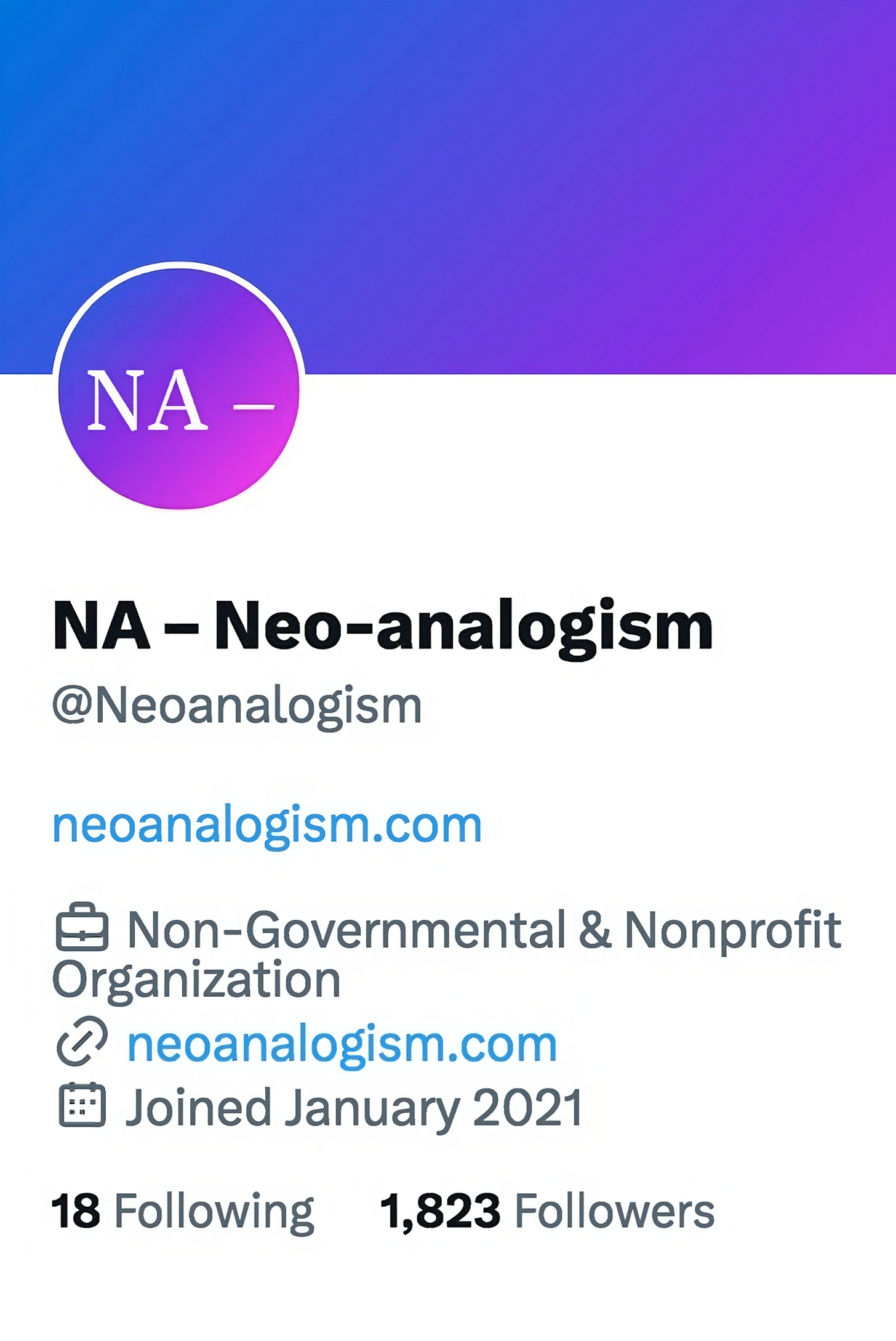Neo-analogism is a non-political movement that seeks the organization of human participants to consciously move away from the ever-increasing threat of hyper-digitalization of our work lives and social interactions. The way this can be achieved is by refusing to give our consent through all the means that we can currently exercise, legal or otherwise, as we are bestowed with free will. The objectives of this movement can only be achieved by way of voluntary, non-violent means. Neo-analogism is logically coherent and easy to understand across all age groups and education levels. The rise of AI along with aggressive digitalization impacts us all equally, despite any category we belong to in society. Briefly, the primary goal of Neo-analogism is to encourage society’s stakeholders to opt to utilize analog technology over digital technology. We all have a vested interest in the course of our lives and of those in our community. We are all stakeholders.
There is no singular or binary solution. Instead, this process can be understood as walking back from the precipice of inhumanity that the proliferation of AI presents to us. The goal is to primarily shift away from that which is digital (intangible) to that which is and was analog (tangible). This is opposed to Luddism and rash anti-technologism as that would be untenable in practice and unrealistic in gaining social acceptance. This movement is expressly against the unlawful destruction and dismantling of technological assets that exist today.
Neo-analogism is a movement that looks towards the horizon of forthcoming developments and aims to reconsider the future of humanity’s relationship with tech. Millions are at risk of losing their jobs in the near-to-distant future due to tech, conversely, millions are dependent on tech jobs supporting their livelihoods. Technology poses countless benefits and utilities to humanity, which our vulnerable rely on, e.g. healthcare and medicine. However, a collective agreement, while we’re able, to walk back from the point of no return will restore jobs lost and prevent any further hardship for ordinary people. Technology in the 21st century has progressed exponentially in terms of efficiency, but is efficiency for efficiency’s sake in humanity’s best interest?
This foreboding issue was presented almost one decade ago with respect to automation, but now the wolf is at the door. This issue is developing encompassingly and isn’t restricted to employment that can merely be remedied by Universal Basic Income or other financial subsidies. We are facing a meaning crisis where the world as we have known it is unnervingly transforming before us. The developers of these paradigm-shifting applications and platforms must present clear and transparent information as to the modalities of the mechanisms that are being used on us without our consent being granted.
Neo-analogism is a movement that exalts and reveres mankind’s capacity to act freely, according to one’s will and further, to participate in informed consent. Without the necessary two-way channel of communication between tech developers and civil society, consent is left out of consideration. That is to say, without the tech developers optimizing their philosophy and means to achieve their current control, we are effectively unwitting participants on a blind trajectory. A blind trajectory that is unknown to its subjects and unarticulated by its creators.
It must be acknowledged that this phenomenon has frequently been grappled with by man throughout recorded human history. This is evidenced by the cases of the unsuccessful Luddite movement in response to the industrial revolution and more recently, the UBI forewarning of the trucker-automation dilemma. However, it must be noted that those examples take a singular approach that was not popularly embraced by members of society. Today, by contrast, the present threat of AI and its acute impact on society is widespread and deeply understood by most members of the public. Therefore, Neo-analogism should seek an inclusive and wide-spanned approach to dealing with this challenge and how to mitigate it before we lose control.
As mentioned before, upon being presented with the circumstances of the existing threat posed by AI and digitalization, a common response may be that: “though there are millions of those who are at-risk of losing their occupations, millions of jobs exist and are emerging in technology and AI-systems to counteract the occupational mass-departure in the economy.” (or something along those grounds). The best response to this, is that the nature of technology is based on cost-effectiveness and as a result we are beginning to see mass layoffs in tech. Moreover, alarm bells have been rung by several high-profile figures and tech elites.
A gradual conscious rewind by willing participants in civil society will greatly improve the condition which we are currently in. To emphasize, a rewind button best represents the essence of Neo-analogism. The way this “rewind” can be facilitated is by setting up a year-based timeline of the advent of the digital revolution, and to affix it on an agreed-upon map. Following this, we note where we are as a society and what we have accepted and depend on. Finally, we rewind backwards along this timeline and set up positive reinforcement in our social lives and financial incentives in occupational settings to opt out voluntarily and consensually from that which is digitally expedient and convenient. For instance, medical advancement to tech-dependent services that aid life-preservation is acceptable and isn't at odds with Neo-analogism.
Neo-analogism is a peaceful movement and as such, it is imperative to use non-violent and non-aggressive means to advance the cause, as those measures are counterproductive, illegal and categorically negative. The author has gone to great lengths to avoid the naming of famous individuals and the targeting of particular software companies in order to appeal to fairness. The mission of Neo-analogism is fundamentally positive in all respects. Positive encouragement to others is an important strategy to gain the approval of the workings of society. Those who oppose Neo-analogism will invariably appeal to irony or hypocrisy whenever the usage of tech is employed to transmit its message. However, it is important that the purpose of the movement isn’t a negation of technology but a platform of advocacy to prioritize analog technology over digital technology. This is to say, opt for the stack of papers over the cloud, the bureau over the server, human learning over machine learning. The key mechanism of peacefully implementing this collective goal is through the use of rewards. The particular rewards and what they entail will be revealed in the near future…
FAQs (Frequently Asked Questions)
What is Neo-analogism?
Neo-analogism is a non-political movement aiming to shift society from hyper-digitalization to analog technology. It advocates for voluntary, non-violent actions to counter the increasing reliance on digital technology in work and social interactions.
What are the primary goals of Neo-analogism?
The main goal is to encourage society to opt for analog technology over digital technology, preserving jobs and reducing dependence on AI and digital systems. It aims to address the potential negative impacts of digitalization on employment and societal well-being.
Is Neo-analogism against all forms of technology?
No, Neo-analogism is not anti-technology. It seeks to prioritize analog technology where feasible and beneficial, while recognizing the essential role of certain digital technologies, such as those in healthcare and life-preserving services.
How does Neo-analogism propose to achieve its goals?
The movement advocates for setting up a timeline to "rewind" societal dependence on digital technology, using positive reinforcement and financial incentives to encourage the use of analog methods voluntarily and consensually.
Why does Neo-analogism emphasize the use of analog technology?
Analog technology is seen as more tangible and less prone to the issues associated with digital technology, such as job displacement due to automation and AI. It promotes a more human-centered approach to technology use.
What distinguishes Neo-analogism from Luddism?
Unlike Luddism, which opposed technological advancements often through destructive means, Neo-analogism seeks peaceful and voluntary measures to balance the use of technology, focusing on promoting analog over digital without destroying existing technology.
Why is Neo-analogism important in the current technological landscape?
With the rapid advancement of AI and digital technologies, Neo-analogism addresses concerns about job displacement, loss of human agency, and societal impacts, advocating for a balanced and human-centric approach to technology.
What are some examples of how Neo-analogism can be implemented?
Examples include choosing paper documentation over cloud storage, preferring face-to-face communication over digital messaging, and promoting human learning methods over machine learning systems.
How does Neo-analogism address the concerns of technology dependence in critical sectors?
While promoting analog technology, Neo-analogism acknowledges the necessity of certain digital technologies in critical areas like healthcare, ensuring that life-preserving and essential services are not compromised.
What is the stance of Neo-analogism on AI and automation?
Neo-analogism views the unchecked proliferation of AI and automation as a threat to employment and human agency. It advocates for a conscious reduction in reliance on these technologies to maintain meaningful work and social interactions.
How does Neo-analogism propose to gain societal acceptance and participation?
The movement focuses on positive encouragement, rewards, and transparent communication to gain approval and participation from society. It avoids negative or destructive tactics, aiming for inclusive and peaceful advocacy.
Copyright Neo-analogism © 2025 *All Rights Reserved*





